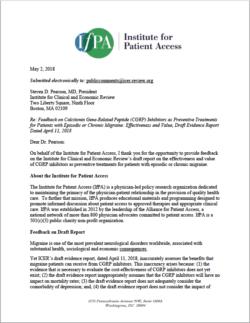 Migraine is one of the most prevalent neurological disorders worldwide, associated with substantial health, sociological and economic consequences.
Migraine is one of the most prevalent neurological disorders worldwide, associated with substantial health, sociological and economic consequences.
Yet ICER’s draft evidence report, dated April 11, 2018, inaccurately assesses the benefits that migraine patients can receive from CGRP inhibitors. This inaccuracy arises because: (1) the evidence that is necessary to evaluate the cost-effectiveness of CGRP inhibitors does not yet exist; (2) the draft evidence report inappropriately assumes that the CGRP inhibitors will have no impact on mortality rates; (3) the draft evidence report does not adequately consider the comorbidity of depression; and, (4) the draft evidence report does not consider the impact of CGRP inhibitors on the vast and costly opioid crisis in the United States. A further concern is: (5) the draft evidence report fails to report fundamental data relied upon when performing the analysis.

